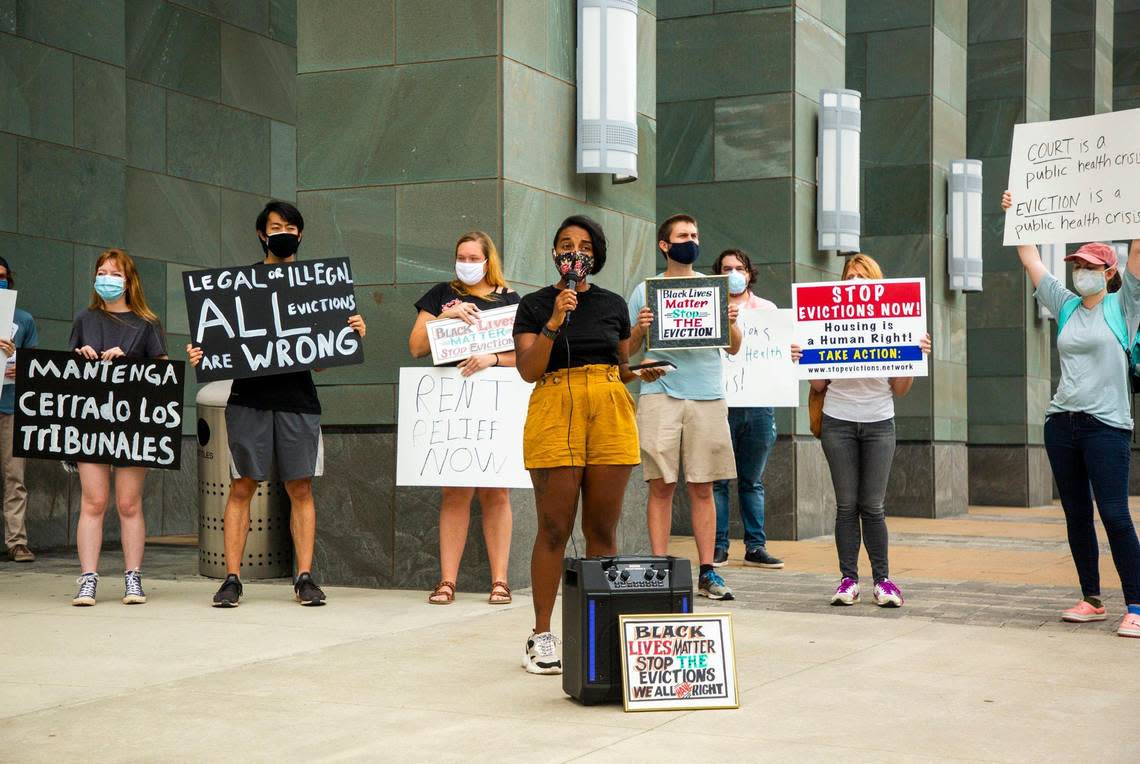Durham to pause pandemic rental assistance applications due to large backlog

Durham tenants who need help paying rent because of the pandemic have until Oct. 4 to apply as the county will pause acceptance then to focus on thousands of outstanding applications.
Since the federally funded program started in May, Durham County has received over 6,900 applications and paid out $7.5 million in assistance to landlords, as of Tuesday. Of those, 3,000 are still being processed, with $953,000 still available under the first round of rental aid funding from the federal government.
Durham County officials said the pause is temporary and will last until the county Department of Social Services can determine there are enough funds to process existing applications.
Once the county has gone through the rest of the first round round funding, there is $8.1 million in rent aid that was allocated from North Carolina’s federal allocation in a General Assembly bill from May.
“What we’re seeing is the need to just try to get the rest of this money out the door,” said Ben Rose, director of DSS. “This will help us be able to process quicker.”
Congress allocated two rounds of rental assistance to states and local governments that met a population threshold.
Rose told The News & Observer that Durham’s second round of federal funding — about $7.6 million — can be used not just for emergency rental aid but for more permanent solutions to housing instability. He said the county hasn’t determined yet how much of the second round will be used for rental aid.
Tenants still have until Oct. 4 to apply. Rose said applications have tapered off recently.
“We were getting hundreds early on,” Rose said. “It’s not been quite quite to that level in the last three weeks or so.”
Eviction prevention
Rose said the county is focusing on applications where the tenant is facing an imminent eviction.
Eviction protections ended in late August when the U.S. Supreme Court, in an unsigned opinion, struck down a moratorium on non-payment, pandemic-related evictions. The court ruled that the Centers for Disease Control and Prevention, which issued the order, overstepped its authority.
Aside from a few days pause in early August, the CDC moratorium had lasted from Sept. 4, 2020, until the court struck it down Aug. 26.
DSS has placed two social workers inside the Durham County Courthouse to work with the judiciary to prevent evictions of tenants who have applied for rental assistance and whose applications are pending approval.
“Both parties are there, the tenant and the landlord, so we’re able to get with them right there, get everything we need and get it paid. We’ve actually prevented some evictions with that process,” Rose said.
Small minority of landlords not accepting aid
To be eligible for rental assistance, tenants must have lost income, been unemployed or had a significant financial hardship due to the pandemic.
They also must make 80% or below the area median income.
Along with this means testing, landlords must agree to accept the funding.
Some landlords in Durham County have refused aid, but a vast majority have not, said Janeen Gordon, assistant director of aging and adult services at DSS.
“We have a small handful of landlords who continue to decline payment, as the purpose of moving forward with the eviction is oftentimes a separate issue than non-payment,” Gordon wrote in an email to The N&O.
She wrote that she doesn’t know of any landlords not accepting aid because of processing issues.
Once the application has been submitted, the county averages fewer than 14 days to when they have initiated payment to the landlord.
The county has approved 99% of the applications it has processed, as of Tuesday, Gordon said.
Rose said that some landlords are willing to go without the aid because they want a new tenant.
“Sometimes there’s just landlords that just want to move on from tenants, and they’re just not going to cooperate from that standpoint. But for the most part, our landlords have been been very, very cooperative,” Rose said.
Is available aid enough to meet need?
Rose said the rental aid from Congress isn’t enough to meet the need in Durham County because housing instability was an issue before the pandemic.
“We’re putting a Band-Aid on a severed artery,” Rose said. “We just don’t have enough affordable housing.”
According to a 2019 study conducted by the N.C. Housing Coalition, 49% of renter households in Durham County spend more than 30% of their income on housing costs.
“We really need to start thinking about long term. How do we get strategies in here to keep people sustained in housing?” Rose said. “Once they get to that stable place again, are they going to be right back in a situation where they’re paying 70% of their income towards the rent?”
“We still have a serious affordable housing issue in Durham County that we need to really look at structurally,” he said.
How to apply for aid
Tenants in Durham County can apply online at DurhamERAP.dconc.gov or by choosing option 7 after calling 919-560-8000. They can also email durhamerap@dconc.gov.
Renters can reach out to Legal Aid of North Carolina at 866-219-5262 for legal help with an eviction. They can also apply for Legal Aid’s assistance at legalaidnc.org/get-help/apply-online.
An agency that wants to refer a resident facing eviction in Durham can email the Durham Eviction Diversion Program at alexisc@legalaidnc.org.
Help us cover your community through The News & Observer's partnership with Report For America. Contribute now to help fund reporting on housing affordability in the Triangle, and to support new reporters.

 Yahoo Movies
Yahoo Movies 
